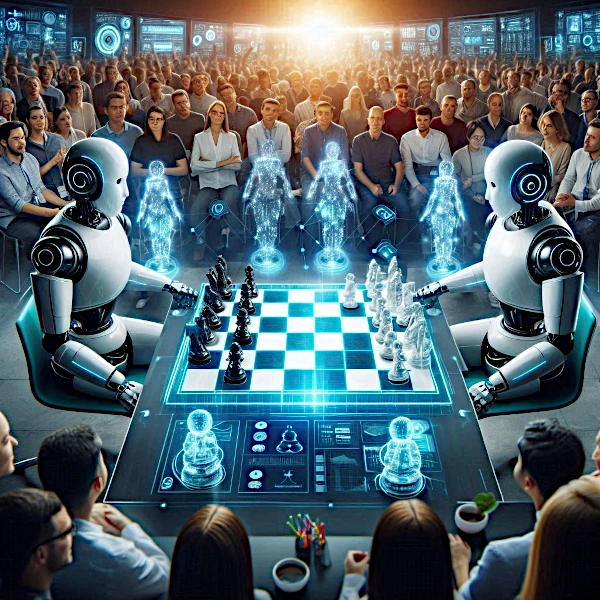
Image description: Theoretical Encounter AlphaGo vs AlphaGo Zero. This theoretical comparison is based on simulations, internal tests, and evaluations conducted by DeepMind researchers. They used metrics and benchmarks to measure the performance of both systems. Image source: astronoo.com
The story of the encounter between AlphaGo and AlphaGo Zero marks a significant turning point in the field of artificial intelligence (AI). These two systems, developed by DeepMind, a subsidiary of Google, not only pushed the boundaries of what was thought possible for machines but also opened new horizons for machine learning and AI in general.
AlphaGo, launched in 2016, made headlines by defeating Lee Sedol, one of the world's best Go players, in a series of highly publicized matches. Go, a complex strategy game originating from China, was considered one of the last bastions of human superiority in strategy games. The victory of AlphaGo demonstrated that machines could not only match but also surpass humans in tasks requiring advanced intelligence and strategy.
AlphaGo used a combination of supervised learning and reinforcement learning techniques. It was trained on millions of Go games played by humans and then refined its skills by playing against itself. This approach enabled AlphaGo to develop innovative strategies and surprise even human experts.
AlphaGo Zero, introduced in 2017, represented an even more impressive breakthrough. Unlike AlphaGo, AlphaGo Zero was not trained on human-played Go games. Instead, it learned to play Go from scratch, using only the rules of the game and playing millions of games against itself. This approach, known as reinforcement learning from scratch, allowed AlphaGo Zero to develop entirely new strategies and surpass AlphaGo in just 40 days of training.
The theoretical encounter between AlphaGo and AlphaGo Zero was a key moment for assessing the progress made in the field of AI. These matches took place in a laboratory environment at DeepMind, based in London. They were conducted for research purposes and did not take place in front of an audience or in a competitive setting. The results showed an overwhelming dominance of AlphaGo Zero, with a victory ratio of 100 to 0 against AlphaGo Master. This victory demonstrated that AI systems could learn and improve autonomously, without relying on human data for guidance.
AlphaGo Zero's victory had profound implications for AI. It showed that machine learning systems could be even more powerful and efficient when freed from the constraints of human data. AlphaGo Zero's victory reinforced China's determination to invest heavily in AI research and development. The Chinese government has already launched several initiatives to become a global leader in this field. For instance, the "Made in China 2025" plan includes ambitious goals for AI, and Chinese companies such as Baidu, Alibaba, and Tencent are investing billions in AI projects.
The theoretical encounter between AlphaGo and AlphaGo Zero will go down in the annals of AI history as a pivotal moment. It not only demonstrated the impressive capabilities of machine learning systems but also opened new horizons for the future of AI.